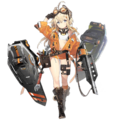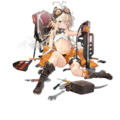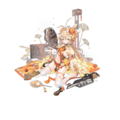Ranking of this Doll's specs relative to other Dolls of the same type.
MK3A1: Difference between revisions
HellScythe42 (talk | contribs) mNo edit summary |
No edit summary |
||
| (12 intermediate revisions by 7 users not shown) | |||
| Line 8: | Line 8: | ||
|manufacturer = Pancor Corporation | |manufacturer = Pancor Corporation | ||
|artist = {{artist name|NAMYO}} | |artist = {{artist name|NAMYO}} | ||
|voiceactor = | |voiceactor = {{voice actor name|Shirasu Saho}} | ||
|fullname = Pancor Jackhammer Mk3A1 | |fullname = Pancor Jackhammer Mk3A1 | ||
|releasedon = {{doll_server_alias|server=CN|alias=MK3A1}}, {{doll_server_alias|server=TW|alias=MK3A1}}, {{doll_server_alias|server=KR|alias=MK3A1}} | |releasedon = {{doll_server_alias|server=CN|alias=MK3A1|year=2022|month=7}}, {{doll_server_alias|server=TW|alias=MK3A1}}, {{doll_server_alias|server=KR|alias=MK3A1}}, {{doll_server_alias|server=EN|alias=MK3A1}}<!--, {{doll_server_alias|server=JP|alias=MK3A1}}--> | ||
| weaponinfo = | |weaponinfo = | ||
The Pancor Corporation Jackhammer is a 12-gauge, blow-forward gas-operated bullpup | The Pancor Corporation Jackhammer is a 12-gauge, blow-forward, gas-operated, bullpup revolver shotgun designed in 1984 and patented in 1987. Only three working prototypes of the Jackhammer were ever built, and two of those prototypes were destroyed during testing. Nonetheless, the weapon's distinctive aesthetics and unique design have led to the Jackhammer showing up in various action films, television programs, and video games. <ref name = "pancor jackhammer wiki">[https://en.wikipedia.org/wiki/Pancor_Jackhammer Wikipedia article on the Pancor Jackhammer]</ref> | ||
The Jackhammer was the brainchild of American firearms designer and founder of Pancor Corporation John A. Anderson. The design was based on Anderson's experiences with using pump-action shotguns in the Korean War, as he found loading a pump-action shotgun to be awkward and time consuming and wanted to come up with a better system. | |||
The design of the Jackhammer is wholly unconventional, and can best be described as a gas-operated revolver shotgun. The weapon was laid out in a bullpup configuration to help make it more compact, and many parts of the design were constructed out of Rynite polymer to save weight. The Jackhammer was loaded from a 10-round revolving cylinder located behind the pistol grip. The cylinder's method of rotation was very similar to the Webley–Fosbery Automatic Revolver, with an operating rod being used to rotate the cylinder, although the Jackhammer was gas-operated as opposed to the recoil operation of the Webley-Fosbery.<ref name = "forgotten weapons jackhammer">[https://www.youtube.com/watch?v=b4SfB6GR62Q Forgotten Weapons video on the Mk3 Jackhammer]</ref> The Jackhammer would have been capable of semi-automatic and fully automatic fire, selectable by way of a thumb safety/selector switch. At the moment of firing, the front of the 12-gauge shell was sealed inside the breech of the barrel much like the Nagant M1895 revolver. Unlike the Nagant, whose cylinder moved forward to form the seal, the barrel of the Jackhammer was driven forward and away from the cylinder by a ring-piston using gas tapped from the bore. As the barrel moved forward, the breech cleared the front of the fired cartridge and an operating rod attached to the barrel rotated the cylinder through a "zig-zag" cam arrangement. As the next shell aligned with the bore, the barrel returned under spring pressure back into the front end of the cylinder. Spent shells were retained in the cylinder, as in a traditional revolver. The Jackhammer featured a charging handle in the forward grip to charge the weapon, and a cocking lever in the buttstock to reset the firing mechanism in case of light strikes to the primer. For reloading, the cylinder was removed from the bottom of its housing and shells were manually extracted. Removing the cylinder required the barrel be moved and secured in the forward position. | |||
Reportedly, several foreign governments expressed interest in the Jackhammer design, and even ordered initial production units once they ready for delivery. However, export of the design was held up for production due to United States Department of Defense testing. Testing was done by HP White Labs, and resulted in two of the three Jackhammers produced being destroyed. The examples sent to HP White Labs reportedly had 4 lbs (1.8 kg) of material removed by using increased stampings instead of castings and a different easier method of reloading. As a result, the sole surviving example is not truly indicative of what an actual production model would have been like, and is better considered a tool room prototype. Ultimately, the design was rejected for military adoption, and so attention was instead turned to the commercial market. Unfortunately, civilian sales of the shotgun were made impossible by the classification in the US of the Jackhammer as a machine gun and restrictions on machine gun manufacturing enacted in 1986. Additionally, those foreign governments that did express interest were unwilling to finance development and final production to bring the design up to military standards. With no customers and little interest, Pancor went bankrupt. Supposed overseas orders were subject to United States Department of State approval that was not forthcoming. The assets of Pancor were sold off, including the few remaining prototypes built. | |||
|design= | |design= | ||
|personality = | |personality= | ||
She is an inventor who doesn't care for trifles and is fascinated with anything new. Her head is constantly running wild with wacky thoughts, and she's always blurting out shocking things, even in inappropriate settings. But even so, it is impossible to dislike someone so smart and charming. Not to mention, the small gadgets that she hands you will always come in handy. | |||
|min_hp= 110 | |min_hp= 110 | ||
| Line 48: | Line 55: | ||
|tile7= 1 | |tile7= 1 | ||
|tile8= 1 | |tile8= 1 | ||
|costume1 = Mellowed Maroon | |||
|costume2 = The Art of MK3A1 Maintenance | |||
|costume3 = costume3 | |||
|gallery=<gallery> | |gallery=<gallery> | ||
File:MK3A1_S.png|Profile image | File:MK3A1_S.png|Profile image | ||
File:MK3A1 | File:MK3A1.png|Full artwork | ||
File:MK3A1_D.png|Full damaged artwork | File:MK3A1_D.png|Full damaged artwork | ||
File:MK3A1 costume1.png|"Mellowed Maroon" full artwork | |||
File:MK3A1_costume1 D.png|"Mellowed Maroon" full damaged artwork | |||
File:MK3A1 costume2.png|"The Art of MK3A1 Maintenance" full artwork | |||
File:MK3A1_costume2 D.png|"The Art of MK3A1 Maintenance" full damaged artwork | |||
File:MK3A1 costume3.png| | |||
File:MK3A1_costume3 D.png| | |||
</gallery> | </gallery> | ||
|galleryAlt=<gallery> | |galleryAlt=<gallery> | ||
File:CHARACTER SETTINGS MK3A1. | File:CHARACTER SETTINGS MK3A1.jpg|Official character sheet of MK3A1 | ||
File:A Sunlit Spring's Bouquet Login Wallpaper.png|"A Sunlit Spring's Bouquet" login screen by ??? | |||
</gallery> | </gallery> | ||
| trivia = | |trivia = | ||
*A toolroom prototype that is in technical firing condition, but is constructed largely with machine screws and requires disassembly to reload, was owned by Movie Gun Services, during which its forearm was replaced with an MP5SD handguard. This example has since been auctioned. | |||
**Another prototype with more refined construction, though non-functional, was legally registered as a machine gun and has also been auctioned off. | |||
*Unique to the Jackhammer was the ability to convert a loaded cylinder from the weapon into an anti-personnel device similar to a land mine by the addition of a firing mechanism. The cylinder would be loaded with up to ten 12-gauge shells and the firing mechanism fitted over the bottom section of the cylinder. A pressure plate or plunger could then be set to mechanically fire the shells in the cylinder manually, or a spring-loaded timer could be used to rig the cylinder to detonate up to twelve hours later. As the cylinder was designed to contain the pressure of firing normally, it could be discharged and reused when used in this configuration. | |||
}} | }} | ||
Latest revision as of 15:28, 7 December 2024
| MK3A1 | Quotes |
MK3A1 367 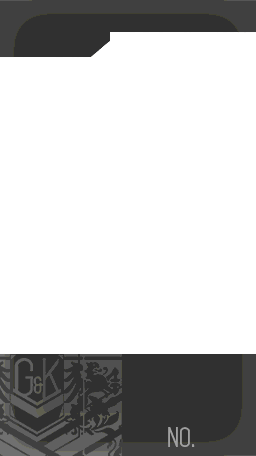 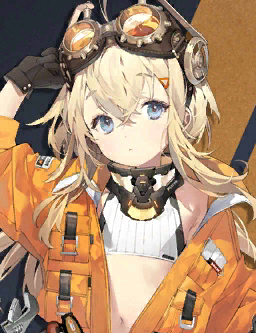 | |
| Gun Information | |
|---|---|
| Full name | Pancor Jackhammer Mk3A1 |
| Country of origin | United States |
| Manufacturer | Pancor Corporation |
| Game Information | |
| Faction | Griffin & Kryuger |
| Manufactured / Revised by |
I.O.P. |
| Voice actor | Shirasu Saho |
| Artist | NAMYO |
| Released on | CN (2022-7), TW, KR, EN |
| Chibi Animation | |
| Variant:
Click the marked area to switch between animations. For details regarding animations, please see Animations on the Wiki. | |
| View page template | |
How to obtain[edit]
NORMALHEAVY Timer 8:30:00. See T-Doll Production for details.
DROP Not obtainable as a drop.
REWARD Not obtained as a reward
Exclusive Equipment[edit]
There is no exclusive equipment for this T-Doll.
Union Skill[edit]
There is no union skill for this T-Doll.
Stats / Data[edit]
| 110(x1) → 220(x1) / 1100(x5) | 30(x1) / 90(x5) | 40(x1) / 140(x5) |
|
| ||||||||
|
| ||||||||
| 6 |
| ||||||||
| 40% | 50% | ||||||||
| 15 | 6 |
Ranking of this Doll's specs relative to every other Doll.
Weapon Background[edit]
The Pancor Corporation Jackhammer is a 12-gauge, blow-forward, gas-operated, bullpup revolver shotgun designed in 1984 and patented in 1987. Only three working prototypes of the Jackhammer were ever built, and two of those prototypes were destroyed during testing. Nonetheless, the weapon's distinctive aesthetics and unique design have led to the Jackhammer showing up in various action films, television programs, and video games. [1]
The Jackhammer was the brainchild of American firearms designer and founder of Pancor Corporation John A. Anderson. The design was based on Anderson's experiences with using pump-action shotguns in the Korean War, as he found loading a pump-action shotgun to be awkward and time consuming and wanted to come up with a better system.
The design of the Jackhammer is wholly unconventional, and can best be described as a gas-operated revolver shotgun. The weapon was laid out in a bullpup configuration to help make it more compact, and many parts of the design were constructed out of Rynite polymer to save weight. The Jackhammer was loaded from a 10-round revolving cylinder located behind the pistol grip. The cylinder's method of rotation was very similar to the Webley–Fosbery Automatic Revolver, with an operating rod being used to rotate the cylinder, although the Jackhammer was gas-operated as opposed to the recoil operation of the Webley-Fosbery.[2] The Jackhammer would have been capable of semi-automatic and fully automatic fire, selectable by way of a thumb safety/selector switch. At the moment of firing, the front of the 12-gauge shell was sealed inside the breech of the barrel much like the Nagant M1895 revolver. Unlike the Nagant, whose cylinder moved forward to form the seal, the barrel of the Jackhammer was driven forward and away from the cylinder by a ring-piston using gas tapped from the bore. As the barrel moved forward, the breech cleared the front of the fired cartridge and an operating rod attached to the barrel rotated the cylinder through a "zig-zag" cam arrangement. As the next shell aligned with the bore, the barrel returned under spring pressure back into the front end of the cylinder. Spent shells were retained in the cylinder, as in a traditional revolver. The Jackhammer featured a charging handle in the forward grip to charge the weapon, and a cocking lever in the buttstock to reset the firing mechanism in case of light strikes to the primer. For reloading, the cylinder was removed from the bottom of its housing and shells were manually extracted. Removing the cylinder required the barrel be moved and secured in the forward position.
Reportedly, several foreign governments expressed interest in the Jackhammer design, and even ordered initial production units once they ready for delivery. However, export of the design was held up for production due to United States Department of Defense testing. Testing was done by HP White Labs, and resulted in two of the three Jackhammers produced being destroyed. The examples sent to HP White Labs reportedly had 4 lbs (1.8 kg) of material removed by using increased stampings instead of castings and a different easier method of reloading. As a result, the sole surviving example is not truly indicative of what an actual production model would have been like, and is better considered a tool room prototype. Ultimately, the design was rejected for military adoption, and so attention was instead turned to the commercial market. Unfortunately, civilian sales of the shotgun were made impossible by the classification in the US of the Jackhammer as a machine gun and restrictions on machine gun manufacturing enacted in 1986. Additionally, those foreign governments that did express interest were unwilling to finance development and final production to bring the design up to military standards. With no customers and little interest, Pancor went bankrupt. Supposed overseas orders were subject to United States Department of State approval that was not forthcoming. The assets of Pancor were sold off, including the few remaining prototypes built.
Character Background
She is an inventor who doesn't care for trifles and is fascinated with anything new. Her head is constantly running wild with wacky thoughts, and she's always blurting out shocking things, even in inappropriate settings. But even so, it is impossible to dislike someone so smart and charming. Not to mention, the small gadgets that she hands you will always come in handy.
Gallery
Main artwork
Gallery consisting of artworks used primarily in-game. For information on how to obtain certain costumes, see Skin Catalogue.
-
Profile image
-
Full artwork
-
Full damaged artwork
-
"Mellowed Maroon" full artwork
-
"Mellowed Maroon" full damaged artwork
-
"The Art of MK3A1 Maintenance" full artwork
-
"The Art of MK3A1 Maintenance" full damaged artwork
Alternative artwork
Alternate gallery consisting of artworks with slight alterations as well as miscellaneous artworks.
-
Official character sheet of MK3A1
-
"A Sunlit Spring's Bouquet" login screen by ???
Trivia
- A toolroom prototype that is in technical firing condition, but is constructed largely with machine screws and requires disassembly to reload, was owned by Movie Gun Services, during which its forearm was replaced with an MP5SD handguard. This example has since been auctioned.
- Another prototype with more refined construction, though non-functional, was legally registered as a machine gun and has also been auctioned off.
- Unique to the Jackhammer was the ability to convert a loaded cylinder from the weapon into an anti-personnel device similar to a land mine by the addition of a firing mechanism. The cylinder would be loaded with up to ten 12-gauge shells and the firing mechanism fitted over the bottom section of the cylinder. A pressure plate or plunger could then be set to mechanically fire the shells in the cylinder manually, or a spring-loaded timer could be used to rig the cylinder to detonate up to twelve hours later. As the cylinder was designed to contain the pressure of firing normally, it could be discharged and reused when used in this configuration.
References[edit]
| List of T-Dolls |
|---|
















